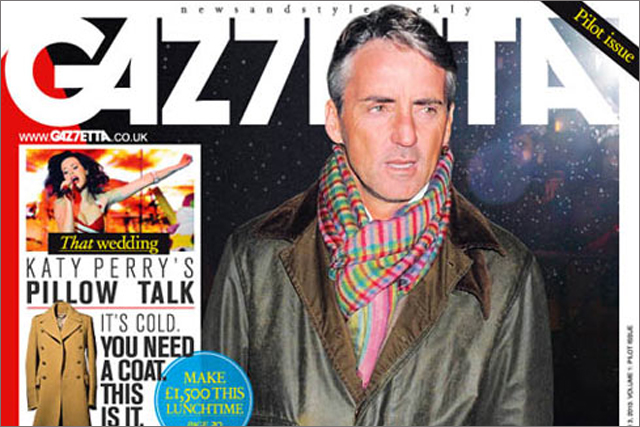Promoting , the News of The World produced a flyer that reads: "Men. Unless we have a free-sheet thrust into our hands, or we're on a train, shelling out for a mag just isn't in our DNA."
The statement has sparked chat among press buyers, publishers and editors as to what the best model for a men's magazine is in 2011.
The launch is timely as the industry awaits news on and the launch of
Will Bauer launch or not launch? That is the question, although one the publisher is not yet prepared to answer publicly.
The success of free magazine ShortList means there is already a weekly men's title dominating the space that Gaz7etta seems to be aimed at.
Phil Hilton, editorial director, ShortList Media, says this will make life tough for Bauer if it launches Gaz7etta.
Hilton said: "It's a bit of a nightmare for potential competitors who are interested in the space we cater for. It's desperately tough trying to find extra value that people will shell out for".
Surprisingly, Hilton disagrees with the News of the World's comment that men only read magazines that are "thrust into [their] hands for free".
He says there is a gap in the men's magazine sector – "there might be something else out there" – and that a successful magazine "doesn't need to be free, but it needs to be good".
Alun Williams, publisher of Men's Health magazine, the highest circulation paid-for men's magazine in the UK (245,754 ABC circulation), agrees.
He said: "I think it's going to be difficult [for Gaz7etta]. If you take away the lad's magazine sector, which is in serious decline, on a weekly basis men tend to either read things focused around news or sport.
"These are well catered for, so Gaz7etta will need to have certain ways of pulling in the readers that will give it a distinct point of difference to what ShortList offers".
The way forward: luxury and free?
While opinion suggests that a new, premium men's glossy aimed at the weekly market is going to be a challenge, evidence shows the monthly luxury titles have weathered the past decade in terms of sustainable circulation figures.
Condé Nast's GQ is the fourth largest paid-for men's magazine in the country, after Men's Health, Bauer's FHM and IPC's Nuts.
But while GQ, , was flat year on year in terms of circulation, FHM and Nuts continued to lose readers at breakneck speed.
Both titles recorded a 17% drop in circulation for the six months to June 2010, compared to the same period the year before.
ShortList and Sport, though free, lead the way in terms of mass reach, with both titles recording a most recent ABC circulation of 518,222 and 305,479 respectively.
Rob Lynam, head of press trading, MEC, said: "The News of the World has identified that the only way to reach men is to give your product away for free. In terms of general lifestyle editorial, men just aren't buying it."
But Vanessa Clifford, head of press, Mindshare, does not believe men only read free magazines. She said: "No, I don't think that's entirely true, because in which case, the only magazines men would bother reading are the ones in newspapers and the freesheets.
"There's a huge industry out there. Men’s Health is a prime example, it's a title that's going from strength to strength."
Either way, does this debate suggest that luxury and free titles at least for now, are the way forward?
GQ's publishing director Jamie Bill said: "Men today are prepared to pay for quality.
"Magazines which saw a peak in the nineties are really struggling now, as the appetite for the kind of content they offer is filled by digital on a regular and often free basis."
Men "want to be taken seriously"
If the success of a magazine is purely led by how good the content is and not its price, as Hilton believes, then what kind of content do men want these days?
The potential births of ShortList Mode and a fashion-led Gaz7etta suggest style and grooming is a serious content driver.
Geoff Campbell, MD of Bauer Media's men's lifestyle brands, says men want to read magazines which are "relevant and engaging".
This echoes ShortList's view that men are no longer interested in buying magazines with naked women plastered all over it.
Hilton, a former editor of Men’s Health who also worked with ShortList's founder Mike Soutar on Nuts and FHM in its heyday, says men "want to be taken seriously as a fully rounded human being, not the beer and pizza caricature of the nineties. That was odd."
Certainly lad's mags have, as Lynam agrees "died a death". Dennis made the call to execute Maxim as on online-only brand in April 2009 in response to flagging circulation figures, and men's monthly Arena shut after 22 years the month before.
Lynam said: "If you're trying to reach men, ShortList have found a formula for it. But it's very difficult for a publisher to launch a paid-for lifestyle title on the newsstand catered for men."
2011 should prove to be an interesting time in the men's magazine sector.
No one would bet against the ABC figures, due next week, continuing previous trends that have seen the number of success stories diminish and the rate of decline of those magazines not hitting the mark quicken exponentially.
Clearly publishers now feel that there is a gap in the men's magazine market, but who will find the right prescription?


